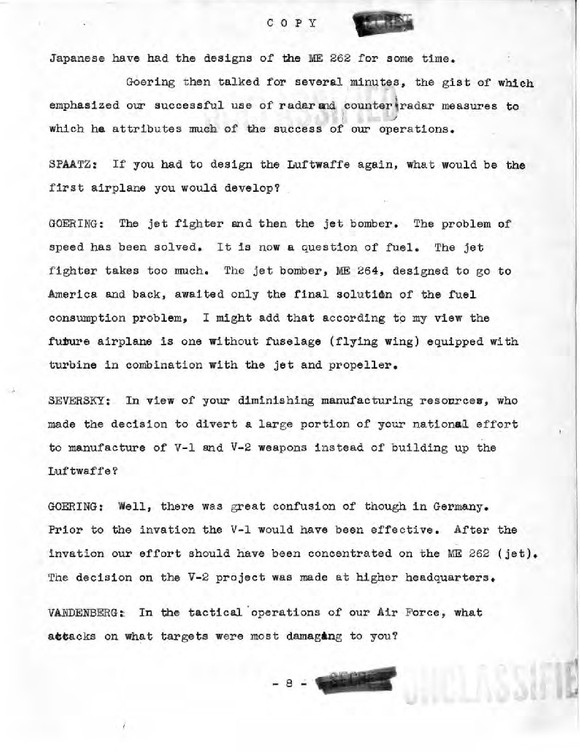Starting from:
$0
Home
World War II
World War II: Interrogations of Hermann Goering by the U.S. Strategic Air Forces in Europe
World War II: Interrogations of Hermann Goering by the U.S. Strategic Air Forces in Europe
World War II: Interrogations of Hermann Goering by the U.S. Strategic Air Forces in Europe
Two reports of interrogations of Reich Marshal Hermann Goering.
Hermann Göring (1893–1946) was a German political and military leader and was a top leader in the Nazi Party (NSDAP). Göering was among those wounded in Adolf Hitler's failed Beer Hall Putsch in 1923. He was made President of the Reichstag and Minister President of Prussia. A veteran World War I fighter pilot ace he was appointed Supreme Commander of the Luftwaffe (the aerial warfare branch of the combined German Wehrmacht military forces during World War II). At the Nuremberg Trial he was found guilty on all four counts and was sentenced to death by hanging. On 15 October 1946, the night before he was to be hanged, Goring committed suicide by ingesting cyanide.
'
Interrogation of Goering by General Spaatz
Interrogation of Reich Marshal Hermann Goering by General Carl Spaatz at Ritter Schule, Augsburg, Germany on May 10, 1945.
Carl Spaatz ( 1891 – 1974) was the American World War II general in command of Strategic Air Forces in Europe in 1944, he successfully pressed for the bombing of the Axis oil production facilities as a priority over other targets. He became Chief of Staff of the newly formed United States Air Force in 1947.
“The Rise and Fall of the Luftwaffe” or "The End of Herman"
A report resulting from a lengthy interrogation of Hermann Goering by officers of the Air POW Interrogation Detachment. Questionnaires were prepared by the United States Strategic Air Forces in Europe (USSTAF) and Air Ministry and were used during the interrogation.
The interrogation dealt also with information of a general and historical nature. Topics included Allied air power, the German Air Force, jet aircraft, Allied strategic bombing, the Battle of Britain, Russian Campaign, Russian Air Force and Japanese forces.
Abstract: How much constant interference affected the overall policy of the Luftwaffe and accelerated its doom is shown in the reflections of the P/W (Prisoner of War) who, by his very nature, pretended to be unaware of the disastrous part that he himself had played in this regard. The report shows how HITLER concerned himself continuously with the smallest technical decisions. During the last two years when GOERING's star - to use his own words - was descending, this interference assumed proportions which caused GOERING to exclaim: "You had a great ally in your aerial warfare, the Fuhrer."


Two reports of interrogations of Reich Marshal Hermann Goering.
Hermann Göring (1893–1946) was a German political and military leader and was a top leader in the Nazi Party (NSDAP). Göering was among those wounded in Adolf Hitler's failed Beer Hall Putsch in 1923. He was made President of the Reichstag and Minister President of Prussia. A veteran World War I fighter pilot ace he was appointed Supreme Commander of the Luftwaffe (the aerial warfare branch of the combined German Wehrmacht military forces during World War II). At the Nuremberg Trial he was found guilty on all four counts and was sentenced to death by hanging. On 15 October 1946, the night before he was to be hanged, Goring committed suicide by ingesting cyanide.
'
Interrogation of Goering by General Spaatz
Interrogation of Reich Marshal Hermann Goering by General Carl Spaatz at Ritter Schule, Augsburg, Germany on May 10, 1945.
Carl Spaatz ( 1891 – 1974) was the American World War II general in command of Strategic Air Forces in Europe in 1944, he successfully pressed for the bombing of the Axis oil production facilities as a priority over other targets. He became Chief of Staff of the newly formed United States Air Force in 1947.
“The Rise and Fall of the Luftwaffe” or "The End of Herman"
A report resulting from a lengthy interrogation of Hermann Goering by officers of the Air POW Interrogation Detachment. Questionnaires were prepared by the United States Strategic Air Forces in Europe (USSTAF) and Air Ministry and were used during the interrogation.
The interrogation dealt also with information of a general and historical nature. Topics included Allied air power, the German Air Force, jet aircraft, Allied strategic bombing, the Battle of Britain, Russian Campaign, Russian Air Force and Japanese forces.
Abstract: How much constant interference affected the overall policy of the Luftwaffe and accelerated its doom is shown in the reflections of the P/W (Prisoner of War) who, by his very nature, pretended to be unaware of the disastrous part that he himself had played in this regard. The report shows how HITLER concerned himself continuously with the smallest technical decisions. During the last two years when GOERING's star - to use his own words - was descending, this interference assumed proportions which caused GOERING to exclaim: "You had a great ally in your aerial warfare, the Fuhrer."


1 file (17.5MB)



